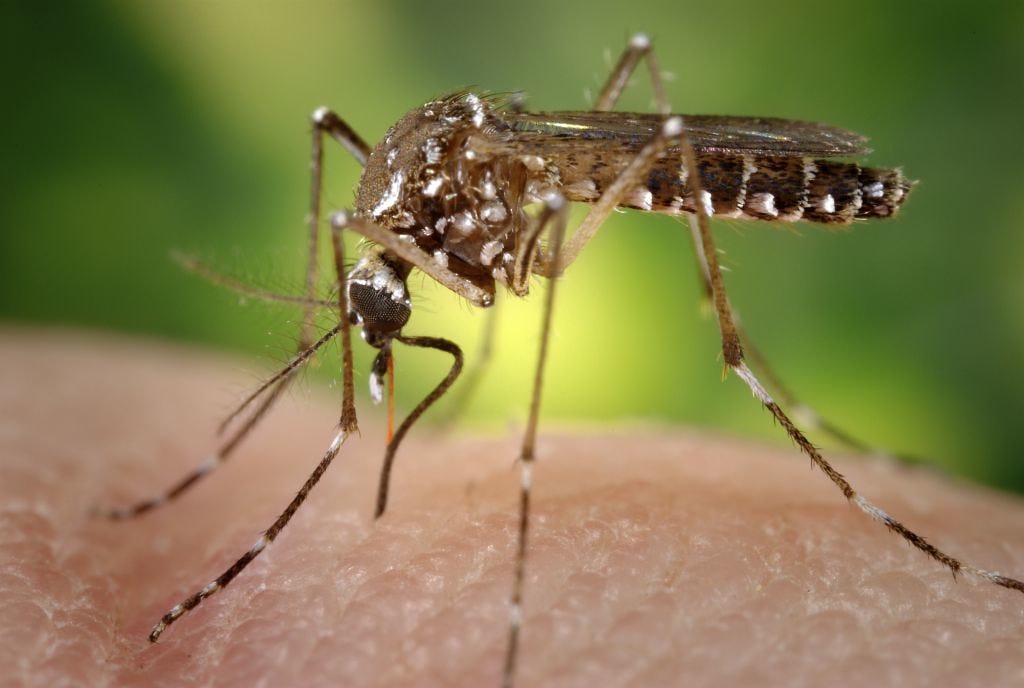Graydon Gordian | February 8, 2024
The Mosquito Edition
On gene-editing, playing God, and the world’s deadliest animal.
Graydon Gordian (GG) is the founder and CEO of The Backyard Care Company (BYC), and a licensed mosquito control professional in the state of Georgia. He believes it should be easy to make your yard a wonderful place for people, pets, and pollinators to spend time. He’s written several WITIs over the years, but this is his first on this topic.
Graydon here. Mosquitos are more than an outdoor annoyance over the summer months. Far and away the world’s deadliest animal, they are a vector for a wide array of diseases with devastating consequences, Malaria being the most notable. Some academics believe mosquitos have killed upwards of 50 billion people over the course of human history. And the problem is getting worse: Global trade has brought invasive species to new continents, and climate change has lengthened mosquito season, increased their overall numbers, and widened the areas where they thrive.
The reassuring news is that increasingly bold and innovative strategies are being employed to control mosquito populations. Take, for example, the work of Oxitec, a U.K.-based company using gene-editing technology to control populations of Aedes aegypti, commonly known as the yellow fever mosquito. They’ve developed male mosquitos that, when they mate, produce females that don’t survive to adulthood, both halting the reproductive cycle and eliminating the vector for disease—if you’ve ever been bitten by a mosquito, it was a female. A headline from a recent NPR article on the company claims this new technology has the potential to “wipe out mosquito-borne diseases.”
Aedes aegypti, commonly known as the yellow fever mosquito.
Why is this interesting?
Here in Georgia, where I live, we have several mosquito-borne diseases: West Nile virus, eastern equine encephalitis, La Crosse encephalitis, St. Louis Encephalitis... The list goes on. The diseases I mentioned have something in common: Aedes aegypti, the mosquito Oxitec is focused on, is not the primary vector. Culex quinquefasciatus, commonly known as the southern house mosquito, is responsible for the spread of West Nile virus and St. Louis encephalitis. Culiseta melanura drives eastern equine encephalitis rates among the birds it most commonly infects, while Ochlerotatus sollicitans and Coquillettidia perturbans are the primary bridge vectors that help it make the infrequent but often fatal jump to horses and humans. If you contract La Crosse encephalitis, it’s likely because you were bitten by Ochlerotatus triseriatus, the Eastern tree-hole mosquito. Mosquito-borne diseases in Georgia aren’t unique in this regard. Of the over 240 million individuals who contract Malaria annually, exactly zero cases were the result of a bite by Aedes aegypti. Instead, Malaria is transmitted by mosquitos belonging to the genus Anopheles.
This isn’t to suggest Aedes aegypti are the OK mosquitos. (That title is reserved for Toxorhynchites and other mosquitos that don’t consume blood.) Aegypti are highly invasive, having spread from their native Africa to Europe, the Middle East, Asia, Australia, and North and South America. They transmit yellow fever, dengue, chikungunya, and Zika. They are the source of an immense amount of suffering, and their populations should be suppressed in a way that doesn’t negatively impact broader ecosystems or harm non-target species, like bees. Oxitec’s technology appears to do just that.
And of course the company is fully aware of what Aedes aegypti is and isn’t a vector for: They are working on extending their gene-editing technology to the Aedes albopictus species and certain members of the Anopheles genus. If they are successful, the long-term impact on global health could be massive. However, I’m skeptical of the article’s claim that “a major plus [of the gene-editing technology] is that it can be used on any species,” given that there are over three thousand different species of mosquito. Only four species across two genera are mentioned on Oxitec’s website, three of which appear to have not yet been successfully controlled.
The article includes one other term worth mentioning: “eradication.” Current mosquito control methods and products have no hope of eradicating mosquitos of any species. They suppress populations with varying degrees of effectiveness and levels of collateral environmental damage. Most everyone wishes they were both more effective and less harmful to non-target species, which Oxitec’s solution seemingly would be. But it’s possible to have too much of a good thing.
As this technology continues to evolve and the number of species it controls expands, I hope Oxitec and other biotechnology companies, entomologists, regulators, and mosquito control professionals both public and private think hard about the impact of eradicating any species, however annoying or deadly. It’s easy to justify eradication when targeting an invasive species, which many mosquitos are, but anywhere on the planet some of the disease-carrying mosquitos are going to be native to that region. And in those areas, they play a role in the overall ecosystem we likely don’t understand fully. We certainly don’t understand what that ecosystem would look like without them. (GG)
Thanks for reading,
Noah (NRB) & Colin (CJN) & Graydon (GG)
—
—
Why is this interesting? is a daily email from Noah Brier & Colin Nagy (and friends!) about interesting things. If you’ve enjoyed this edition, please consider forwarding it to a friend. If you’re reading it for the first time, consider subscribing (it’s free!).
